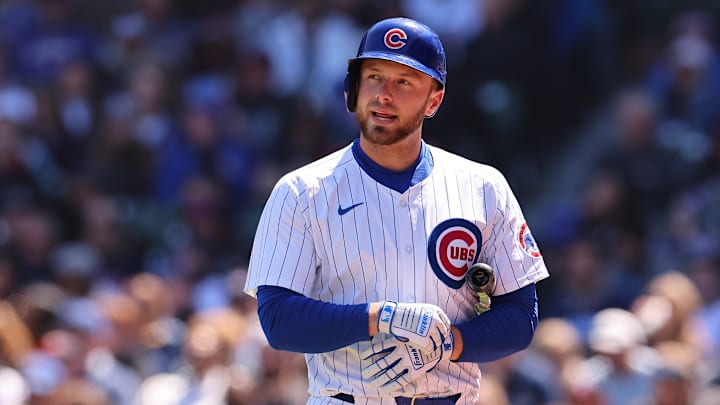Since his home run streak a couple of weeks ago, Michael Busch has looked like a completely different hitter for the Chicago Cubs. The early weeks of the season saw him become the middle-of-the-order bat the team desperately needed and what appeared to be the long-term answer at first base at long last. Over his past 11 games, however, he's fundamentally changed for the worst with many of his greatest strengths, like his plate discipline, becoming weaknesses.
Busch began the year with a stellar .327/.410/.731 slash line, or a 209 wRC+ through his first 16 contests. It wasn't likely that he was going to keep slugging at that level throughout the entire season, but his contact quality and discipline from the minors had seemed to translate directly to the majors, as he boasted a 13.1% walk rate and 26.2% strikeout rate. Over that period, he was posting an average exit velocity of 93.5 mph with a max of 109. By those numbers, he was a very well-rounded hitter and early Rookie of the Year candidate.
His most recent 11 games, however, have seen him hit a paltry .195/.239/.220/32 wRC+ all as his strikeout rate (41%) and walk rate (4%) have taken dreadful turns. The swing decisions are noticeably more suspect and the contact quality, too, is suffering with his average exit velocity down to 84 mph and his hard hit rate plummeting from 51% to 25%. Pitchers have figured out a strong game plan to neutralize his bat by tossing increasingly more curveballs, which he's struggled to hit with a .111 batting average and slugging percentage and a .112 expected batting average.
Busch has the look of a young player who's pressing at the plate right now and making poor choices on what balls to go after. Compared to that first 16-game stretch, he's now swinging outside the zone 38.1% of the time versus only 24.2% to start the year. Those decisions can also partly explain the lower exit velocity as well as the higher groundball rate. When a player's whole mentality on when to swing and their eye at the plat seems to disappear, that's definitely concerning.
Why It's Not Time for the Cubs to Worry About Michael Busch
However, this still looks like the natural growing process for a young player. As the league adjusts and moves away from pumping high velocity into the zone, the onus is on Busch to adjust himself and get out of the mindset of trying to make something happen when he's not getting pitches to hit. The Cubs will no doubt try to help him through that process, but other factors could lead to brighter days.
For one, under Craig Counsell, he's going to get plenty of runway to figure things out. With injuries to Cody Bellinger and Seiya Suzuki and Matt Mervis struggling mightily, there's all the more reason to keep him in the lineup consistently. When those hitters come back, if he's still struggling, the Cubs could also try to better protect him against lefties. Busch is thus far hitting .167/.231/.167/20 wRC+ with Southpaws on the mound, far worse than the 149 wRC+ he's posted against righties. There's nothing wrong with letting him rest on occasion while Patrick Wisdom, who crushes lefties, takes a start at first base in unfavorable matchups.
I also believe simply getting Suzuki and Bellinger back and healthy will help to some degree. Before the injuries to both, there wasn't necessarily as much pressure on Busch to figure it out right away because of how the star hitters were able to elevate the Cubs offense. Without them, however, they've had to lean on him as a middle-of-the-order presence in a lineup that otherwise lacks them.
There are real concerns about Busch's change in approach and his ability to handle breaking pitches. It's up to him to make adjustments, but the Cubs are in a perfect position to make that process as comfortable for him as possible. Combined with some better health going forward, there's hope that he can find his eye at the plate once again.
